- Home
- William Kowalski
The Good Neighbor Page 4
The Good Neighbor Read online
Page 4
32 WILLIAM KOWALSKI
like that once, when she was young, and she remembered all too well how much easier it was to stay hidden.
“Oh, he doesn’t have to,” she said. “He can come in, too, I mean. Don’t keep him out here on our account.”
“I wouldn’t think of it,” said Marge, her voice suddenly tight as a jib. Whatever the teenager had done, he’d sinned mightily, that much was clear. “I’ve got the keys right here. Mr. Hart, would you do the honors, please?” She handed him a key. “The door sticks,” she explained. “You’ll probably have to put your shoulder into it.”
Colt mounted the steps, inserted the key, “put his shoulder into it” three or four times, and the ancient, heavy door swung open.
“Needs to be planed,” he muttered.
He became aware that the house was breathing on him open- mouthed, exhaling the taste of unknown years of emptiness. It was a bitter fragrance, not unpleasant, and it reminded him of something too deep to retrieve at the moment. He stepped down the house’s throat, a long foyer that led into a central room. The two women came along behind him as he paused for a moment, uncertain, and then strode forward, a willing Jonah now. He was already trying to imagine himself living here.
“The For Sale sign was hidden under some leaves,” he told Marge Westerbrook over his shoulder.
“Kids,” said Marge, though she didn’t say which kids; possibly she meant her own, thought Francie.
Marge crossed the room to a massive fieldstone fireplace and lay one plump hand on the mantel, which was a single slab of rock nearly six feet in length and about four inches thick. The fireplace opened on the back to an opposite room; apparently it was meant to provide heat to both areas. Its grate was clean, Francie noticed. No one had had fires here for a long time.
“Now, this is the living room, or one of them, I should say. You can see the other through there, plus there’s an upstairs parlor. This house has nearly ten thousand square feet in all.” Marge paused and bowed her head, as if such a place deserved her rever
The Good Neighbor 33
ence. “Four bathrooms, six bedrooms, a study and a den, a beauti ful dining room, pantry, servant’s quarters on every floor, a games room, an unfinished basement, an unfinished attic, a kitchen you’ll have to see to believe. And the property itself is almost fifty acres.”
Francie gasped. “Fifty acres! Colt, did you hear that?”
Colt had only half heard. He was scanning the beams in the ceil ing and corners of the living room as he listened. For an old house, the room was high. He was exactly six feet tall, and yet if he reached upward he could barely brush the ceiling with his fingers. He ran his hands over a corner beam and felt the long scallops in the wood that told him it had been shaped by hand. Colt had once had a client who was a collector of wooden antiques, and she’d taught him, or tried to teach him, some of the basic distinctions to be made when dealing with objects of wood; he was astonished to discover, ten years later, that he’d learned something.
“This is real,” he said, more to himself than the other two.
“All original beamwork,” said Marge Westerbrook proudly, as if she was responsible for it. “Well preserved, no dry rot, no termites. The place has really been looked after nicely. It’s a real find. You people have excellent taste!” She led them into the kitchen, their feet echoing on the floorboards until they came across slate tiles the color of angry November. Francie cooed; Colt stomped experi mentally, to see if anything came loose; Marge elaborated on the need for plumbing repairs, no sense in being deceitful, she didn’t believe in doing business that way—the place would need work. The last improvements were completed (here she consulted her clipboard) in the mid-1970s. She turned on the tap over the sink, and all three attended to a rush of air, like the hiss of radio signals from a distant star. After a moment it was replaced by a low, gur gling note, the pitch changing as the source of it approached at rapid speed from somewhere below their feet. They were re warded with a gout of brown water that smelled briefly of pond. Then, as if by magic, it ran clear.
34 WILLIAM KOWALSKI
“You have well water!” cried Marge Westerbrook, making Fran cie jump. They each held their hand under the stream for a mo ment, allowing it to impart its subterranean chill to their finger bones. Colt tasted it, cautious. It was sweet and clean, slightly chalky. There was none of the metallic, chemical flavor of city wa ter, no chlorine, no fluoride. No one had touched this water before him, no government official had approved it as fit for his consump tion. There had never been a liquid like this in his life before. He swirled it over his tongue like a vintage wine, closed his eyes, and thought of cave fish, stalactites, stalagmites. They had well water. Marge led them triumphantly through the rest of the house: the master bedroom, spacious and bright; the guest bedrooms, small, numerous, and dim; the parlor, impossibly oak-paneled, as was the den; the bathrooms, which were merely bathrooms. They even went to the attic, a warm, rustic space, floored with un planed boards. Light flooded through the bull’s-eye windows at ei ther end in surprising quantity. In one corner, a plastic tarp had been draped over a pile of something. Pulling this back, Francie found a stack of cardboard boxes. Opening one, she found comic books, mostly of the sci-fi variety from the 1950s and ’60s. Francie gave a coo of delight; she wouldn’t be surprised if some of them turned out to be collector ’s items, provided they hadn’t mildewed. There was also an aged steamer trunk, the kind she had seen on Antiques Roadshow many a time. She pulled up the fragile domed lid and saw that it was empty. She tried, with her poet’s mind, to imagine what kind of person had owned this trunk, and from where they had come with it, and why. Or perhaps it had been purchased for a journey that was never taken, and that was why it was still here, empty. You looked at a trunk and you thought these things, because a trunk meant traveling and dream ing, she thought. It smelled of cedar, as every good trunk should, and was lined in peeling paper, printed in a pattern not unlike
Marge Westerbrook’s blouse.
Francie looked quickly at Colt and Marge, who were at the
The Good Neighbor 35
other end of the long attic, talking about something. Unobserved, she grabbed a random comic book and stuck it in the waistband of her jeans, under her shirt. Then she closed the lid of the trunk and replaced the tarp. If they bought the house, the trunk and books would be theirs, and it wouldn’t be stealing. She didn’t intend to keep it, anyway—she was just going to take it to her friend Wal ter, who owned a used-book store in the city, and was an expert on everything that was printed, from Superman to Shakespeare. He would know what, if anything, they were worth. She pulled her shirt out of her jeans to hide it, and then it was time to go downstairs again.
They had already decided, back in the city, that if they liked the place they would put in an offer right away. They had never dis cussed why they wanted it; they just did, and in the elation of fi nally agreeing on something, they did not examine the matter any further. Also, Colt believed they would get a deal, which in his mind was reason enough to buy it. Who knew how long the place had been empty? Years. Whoever owned it would probably be desperate to sell. It was off the beaten path, far from conve niences, the perfect country retreat. Few, if any, interested buyers would have simply happened by, as they had.
Francie would leave that part of it to him; he was the master deal-maker, the negotiator, the man who could cause publicly held companies to flourish or wither on the vine with a single phone call. Colt arched his eyebrows at her inquiringly, and she nodded back decisively, trying not to giggle at her own seriousness. Marge Westerbrook, expert at detecting these types of exchanges, pre tended to study the floor.
“Let’s talk turkey,” Colt said to Marge.
“I’ll wait outside,” said Francie, and she left with her purloined comic.
4
The Blood of Angels
Afterward, they stopped for lunch in Plainsburg, which, like every other middle-sized
town in Pennsylvania—or in America, for
that matter—had two parts to it. The first was old, dating back in this case to the late nineteenth century, all false wooden store fronts and one or two old stone warehouses-turned-retail-spaces, and a charming, broad brick sidewalk running down both sides of Main Street, itself lined with imitation gas lamps. The second was new, with a four-lane highway on the outskirts of town that boasted a frizzled, litter-strewn grass median, strip malls on either side stretching into the distance as far as the eye could see, and four lanes of traffic moving along in a snarl.
They chose the old part to have lunch in, but not without ar guing about it, and so, sick of each other, they talked little as they ate, not even about the house. Colt was unusually dreamy—un usually for him, anyway—and a poem had drifted into the room and found Francie. They always came to her this way, accosting her like beggar children, arms outstretched. She spent the meal picking absentmindedly at her french fries, trying to capture this
38 WILLIAM KOWALSKI
one on a napkin before it left again. Something about veins run ning through wood. Wood that was like flesh. As usual, it had seemed brilliant at first, but now that she had the shape of it she could see that once again she had failed. It was another abortion. Argh. Feh. She cast a sidelong glance at her husband, who was gob bling his cheeseburger as though there was no such thing as po etry. Or manners. Colt never asked how her poems turned out, she thought resentfully; he didn’t care that for years now they’d been a series of mutants, a lineage of misbegotten circus freaks. Of course, someone like him could not be expected to understand. To him they were just words.
❚ ❚ ❚
“What did you talk about?” she asked him as they sped east, homeward.
Colt turned to look at her and smiled lasciviously. He reached for her thigh and gave it a suggestive squeeze. Francie was sur prised at this; he rarely touched her with any kind of spontaneity anymore. If he brushed against her in the apartment, he was more likely to mutter “Excuse me” than to reach out and caress her. What on earth was going on with him?
“You and Marge,” she prompted him. “What did you say to her?”
“I made an offer,” he said. “She’s going to take it back to the owners.”
His hand was still there on her thigh, squeezing, rubbing, sug gesting. They hadn’t had sex in a month, probably. Maybe six weeks. And now he wanted to mess around in the car, like teenagers? Not likely. Yet despite her indignation, Francie felt her self growing warm. It was the house that was really doing it to him, she told herself. Or the deal. Spending money always made him horny.
“Just like that?” she said. “It’s done?”
The Good Neighbor 39
“No, it’s not done,” he said. “All I did was make an offer. That’s only the first step.”
“Who owns it, anyway?”
“A bank. A bank I own stock in, as a matter of fact.” He slid his hand farther up her leg and began to massage her inner thigh. Through her jeans, she could feel the friction on that never- sunned part of her body, as pearlish and tender as the inside of an oyster shell. She clamped her legs shut like a flytrap and pulled the hair on his wrist. “A bank? Do you think they even know what it looks like?” she asked.
“I’m sure,” said Colt, shaking free of her, “that they have a very clear financial picture of the place.”
“But what it looks like, I said. Not how much it’s worth.” “They’re not stupid people. That’s why I own their stock.” “How much did you offer?”
“Don’t worry about it,” he said. “If you knew it would keep you up tonight.”
“Oh, Coltrane!”
“I said don’t worry. We can afford it. We can afford ten houses like this. About time we started spending some money, don’t you think?”
“I guess so,” said Francie, surprised. It seemed to her that some thing in Colt had changed recently without her noticing, until now. First he had agreed to drive her out to the country, and then he had noticed the house at the same time she did, and now this. She wondered what had brought it about. It was one of the greater ironies of Colt’s character that he took no pleasure in spending money, only in earning it. For him to really get turned on, he had to make a killing at work. He already had piles of money, scads of it, oodles. He had literally more money than he knew what to do with. It was sitting in all kinds of different ac counts, earning yet more money in interest and dividends, and making the two of them rather disgustingly rich, to be honest. But Colt had never before wanted to buy anything big; and Fran
40 WILLIAM KOWALSKI
cie had never been the furs-and-jewelry type. They didn’t even own the apartment they lived in, though they could have easily enough. It occurred to her now that perhaps Colt was entering some sort of Golden Age of his own. If so, she wanted a glimpse of it—just to see. She knew she would never be a part of it, even if he bought them both everything they’d ever wanted. It would al ways be his money, and the things they bought with it would al ways be his things.
Except the house in Pennsylvania. That was already hers. She’d felt it from the moment she set foot on the porch. It was like com ing home.
❚ ❚ ❚
They rounded the Delaware Water Gap again, the water choppy and cold-looking in the slanting sunlight that lay over it as thin as gold foil. A couple of optimistic powerboaters were out, deter mined to make the most of the waning season.
“That looks like fun,” Francie said.
“I never saw the point to having a boat,” said Colt. He reached over to stroke the side of her breast with the backs of his fingers. She took his thumb in her mouth and bit it, gently but seriously, and he pulled away again. “Look at those guys. They drive all the way down here from God knows where with a boat on a trailer, just so they can put it in the water and race up and down. It seems dumb.”
“Why are you coming on to me here, like this?”
“What do you mean, why? You’re my wife, aren’t you?” “Yeah, but.”
“But what?”
“Maybe they like it,” Francie said, looking out at the boats. “Well, they’re idiots.”
“Don’t you ever want to get a boat?”
Frustrated, Colt put his hand back on the wheel. “If I was
The Good Neighbor 41
gonna have a boat, I’d want it to be down in the Keys. Somewhere warm. And I’d want a real fishing boat, not one of these dinky lit tle tubs. A charter-type thing, with two decks and a wheelhouse and . . . all the other stuff you can get.”
“You can get to the ocean through the Water Gap,” she said. “It’s a long ways, but you can do it.”
“You can? How?”
“Down the river,” said Francie. “The Delaware River.” “Why can’t I touch you?”
“You have to earn it.”
Colt smirked. “How do I do that?”
Francie giggled at his impatience. “Through acts of grace,” she said. “Are we going to buy this house?”
“I don’t know yet.”
“Then you don’t get to have sex with me,” Francie said, return ing her gaze to the highway.
They had just entered New Jersey. Colt veered swiftly off the road, making her gasp, and they pulled into the parking lot of the first motel that appeared on the roadside. He turned and leered at her like a high-schooler.
“Coltrane! What am I, a cheap date?” “I was not aware that we were dating.”
She stayed where she was. Colt got out and opened her door. The manager of the motel came to the office door and stared at them— a short, squat man in a T-shirt and long shorts, with kneecaps like softballs. Colt crossed the parking lot on winged feet and handed him a couple of twenties. The man reached inside the office for a key and handed it over.
They went down a cracked concrete sidewalk with weeds growing up through it to a room that smelled of stale cigarettes and chilled air. Colt slammed the door shut and tossed her onto the bed, shedding his clot
hes, then slowly divesting her of her own. When he discovered the comic book in her shorts, he said, “What the hell’s this?”
42 WILLIAM KOWALSKI
“Oh, that. I forgot. I stole it.” “Bad girl. You need a spanking.”
“Don’t hurt me,” she said, closing her eyes.
❚ ❚ ❚
They were in there for half an hour. When Coltrane finally col lapsed on the mattress, spent, Francie opened her eyes again and stared thoughtfully up at the ceiling. She was preoccupied by the notion that Colt hadn’t used a condom. That was rather odd, ac tually, she thought. Colt always used condoms, because she was afraid of the Pill (not another pill, she told him), and the other im plements of birth control, jellies and sponges and diaphragms, were all too cold and squishy and intimidating. Had something else changed too, then? Now that they might own this house, were they finally to talk about having a baby? It wouldn’t do to ask him directly; when you wanted something from Colt and thought he might say no, the last thing you did was ask him di rectly. Maybe he had just forgotten. He wasn’t in the habit of car rying condoms around with him, after all.
At least, she hoped he wasn’t.
She felt between her legs and touched the wetness that had dripped onto her thighs, rubbing it between her fingers. His se men. She hadn’t felt it in some time. When she was younger, she’d imagined that the marrow in her bones would look just like this, not red like blood but white and shimmery, iridescent.
Oh, shut up, she told herself. You think too much. And don’t ask him about it, or he’ll get mad, and the day will be ruined.

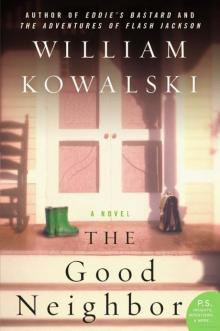 The Good Neighbor
The Good Neighbor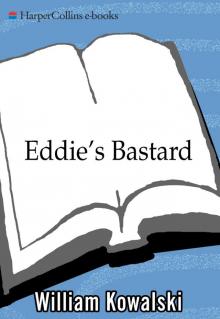 Eddie's Bastard
Eddie's Bastard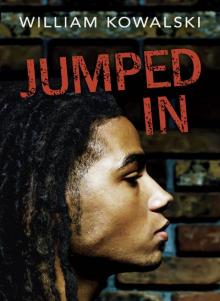 Jumped In
Jumped In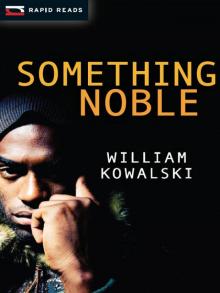 Something Noble
Something Noble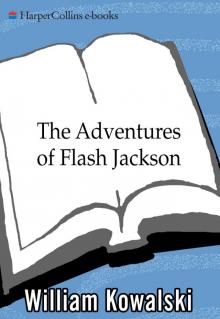 The Adventures of Flash Jackson
The Adventures of Flash Jackson Just Gone
Just Gone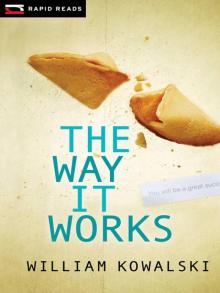 The Way It Works
The Way It Works Epic Game
Epic Game